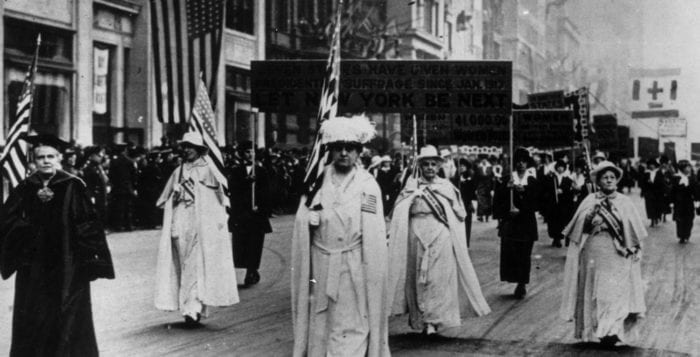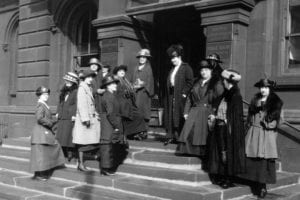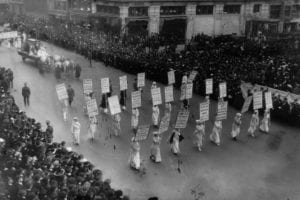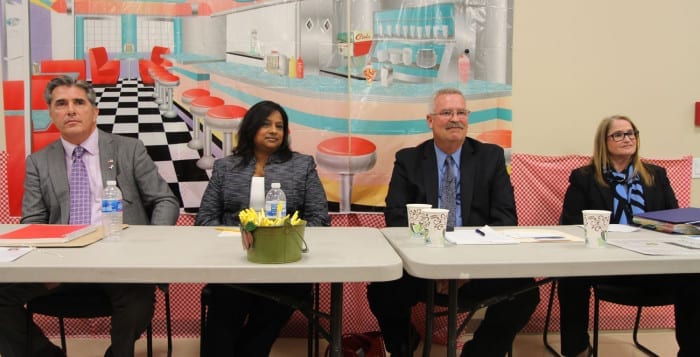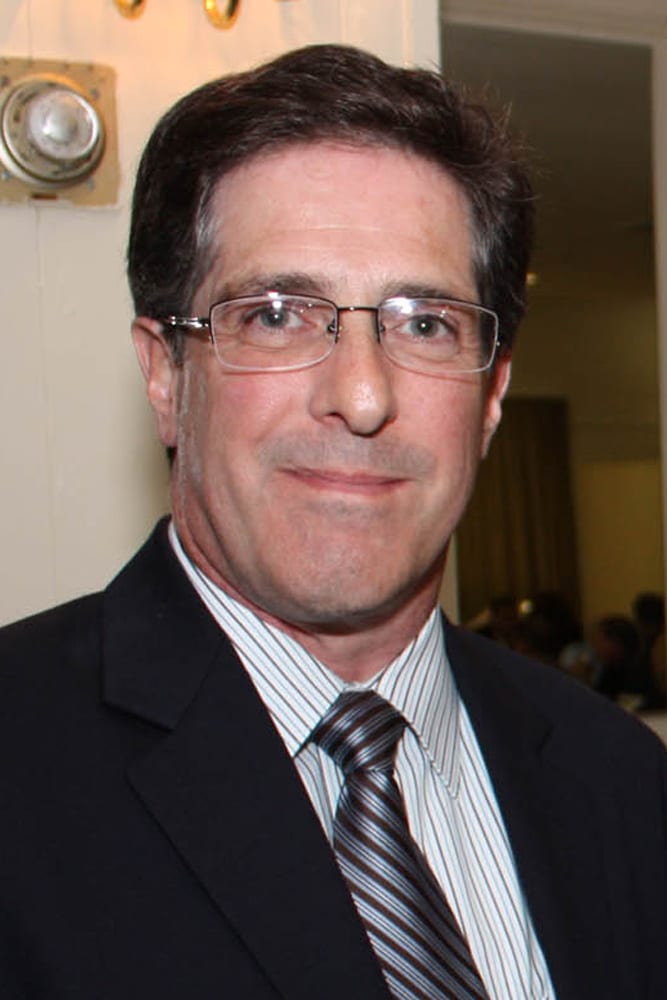Huntington Town Board candidates discussed development, term limits and more at a debate at the Elwood Public Library hosted by the Elwood Taxpayers Association on Wednesday, Oct. 14.
Two seats are up for grabs on the five-member board next month, and four contenders are in the running for the slots. Councilman Gene Cook (I) and Councilwoman Susan Berland (D) are both seeking re-election. Newcomers Jennifer Thompson, a Republican, and Keith Barrett, a Democrat, are looking for a first term.
In his opening statement, Cook said that he is such a strong believer in term limits that if he gets elected in November, he would “term-limit” himself voluntarily, pledging it would be his last run for the seat.
“It’s tough for those people to run that have never run before,” Cook said. “It’s an unfair advantage.”
Cook asked if every other candidate also believed in term limits and both Thompson and Barrett said they did.
“I think that most people come into office with the best of intentions, but the longer you’re there, the more susceptible you are to corruption,” Thompson said. “I do think that there also is benefit to having fresh perspectives and new ideas.” She also said that campaign funding is an uphill battle and incumbents make it a “David and Goliath situation” where it is very difficult for newcomers to raise matching amounts of funds.
Berland, however, said she does not believe in term limits.
“I believe elections are the best term limits,” she said. “If people want you to continue doing the job you’re doing, they’ll vote for you. If they’d rather have someone else do the job, they’ll vote for someone else.”
The most popular question of the night regarded the The Seasons at Elwood, and what each candidate’s opinion was of the project. The Seasons is a planned 256-unit condominium housing community geared towards residents 55 and older.
Cook said his opinion is on the town’s records, because he was the only town council member to vote against the project, which required a change of zone.
“When 5,500 residents who signed a petition against it and said ‘We don’t want it,’ I was right there behind you,” Cook said.
Barrett asked if it really matters what he thinks of the Seasons at Elwood. “How many of you don’t want it?” Barrett asked and the audience responded overwhelmingly that they did not. “Well then you got my answer.” Barrett also said he would have liked to see more community involvement before the project gained approval.
“I’d like to see somebody from the community and the development being involved,” Barrett said. “There is compromise for everything. We have to work on this more as a community and not ramming it down peoples’ throats.”
Thompson countered that she does think it matters what she thinks of this issue. “I will stand with this community and vote against it,” Thompson said.
Berland voted in favor of the project.
“It was a project that I supported because it’s senior housing and there are a lot of seniors who want to continue to live here,” Berland said. “They ended up with a high density number significantly lower than when they started. I think that [the Greens at Half Hollows] has been an amazing economic boom and I’m hoping that the Seasons will end up being the same.”
Some audience members continued to grill her on why she’d vote the project when many residents were against it.
“There were petitions in favor and in opposition,” Berland said. “They were a large number of people in and outside the Elwood community who welcome senior housing. I vote what I think is best for the people of the town and I don’t think this will hurt the people of the town.”
When asked for three items each candidate would prioritize if elected, Thompson started with safety in Huntington Station.
“We deserve the opportunity to walk our streets and feel safe.” Her other two priorities are making sure water quality remains clean and keeping taxes low. Barrett said he’d prioritize cleaning up criminal activities in Huntington Station. He also said parking in Huntington village is a big problem.
“Parking is a big issue because you can’t go down there and buy a slice of pizza without spending a couple bucks on parking,” Barrett said. His third issue is spending. He said he would like to broaden the scope of certain town department to get Huntington taxpayers the best bang for their bucks.
Cook brought up the shock he felt when he learned the news of Maggie Rosales, an 18-year old who died after she was stabbed in Huntington Station last year. Cook said he went to Supervisor Frank Petrone (D) with a plan to put public safety cars on the road, and link them up with 2nd Precinct to help cut crime. He also said he would like to challenge the some of the numbers in the supervisor’s budget. “I never once voted for Frank Petrone’s budget.”
All the candidates were unanimous on the issue of the ongoing litigation between Huntington Town and the Long Island Power Authority. The utility is suing the town to recover some $270 million in property taxes it paid since 2010, arguing the aging Northport power plant is grossly over-assessed.
Berland said she has been totally in favor of the litigation since day one.
“I think LIPA has to keep with the agreement that they made from the beginning that they would not ask for reassessment,” Berland said. She also said that Cook was the only vote against the litigation and that he wanted to settle instead, and that is something she strongly disagrees with.
Cook said he voted against initiating litigation because he was told if the town loses, Huntington could be on the hook for a large sum of money. He has since changed his stance — he said he believes at this point it is past negotiations and that they have to fight.
Barrett is in favor of fighting LIPA, and Thompson, who voted on the school board to put the district into the court battle, said she still strongly is for the litigation.
The next debate between the candidates will be sponsored by the League of Women Voters. It will take place at Harborfields Public Library on Oct. 26 at 6:30 p.m. at 31 Broadway in Greenlawn.

